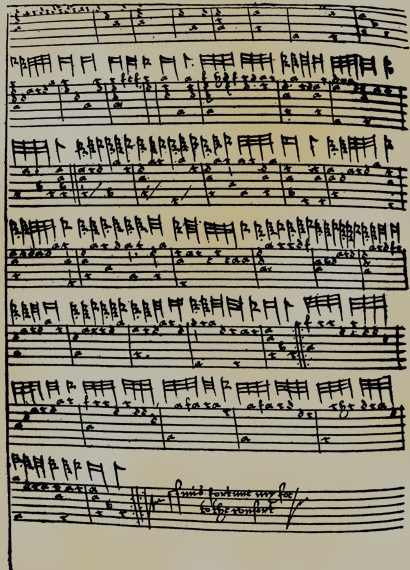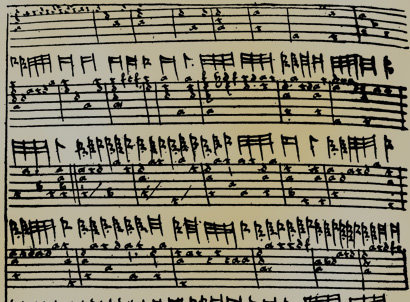
Turkeylony, sometimes spelled Turkeyloney was a popular dance from the renaissance era of King James I and Queen Elizabeth I. There is no certainty where the name originated. It has been surmised that the word Turkeylony is derived from the Italian Tordiglione. A Tordiglione was a type of Italian Galliard which is a dance that utilizes five steps to a measure .
In England, the Turkeylony was originally a country dance. However, as with many popular country dances it made its way into aristocratic circles as a court dance where it most likely earned its name.
There are at least two known songs from the English Renaissance entitled Turkeylony. One of the versions is also known as The God of Love. However, the rendition of Turkeylony presented here was originally transcribed from William Ballet’s Lute Book. Ballet’s original manuscript resides in Trinity College in Dublin. William Chappell transcribed the tune in 1859 in his work Popular Music of the Olden Time. Vol. 1.
The following recording of Turkeylony uses an arrangement of Violin, Viola and Piano. In William Ballet’s time this would have been considered a mixed, or broken consort because there were more than one instrument families performing the song.
It is believed that although William Ballet started the book, there was more than one author. This is because there are different hand writing styles and colored inks used throughout the manuscript. Ballet’s Lute book was most likely a student work used for the instruction of music theory and site reading.
William Chappell paired Ballet’s Turkeylony with the ballad If Ever I Marry, I’ll Marry a Maid. This was clearly a rather crass song favored by young men. It is a ballad probably more suited to a bachelor’s party than a modern wedding ceremony. Still, reveler’s of today will certainly appreciate it’s comic approach toward picking one’s spouse. The following lyrics are from the broadside If Ever I Marry, I’ll Marry a Maid.
1
If ever I marry, I’ll marry a maid
To marry a widdow, I’m sore afraid
For maids they are simple and never will grudge
But widows full oft, as they say know to mutch.
2
A maid is so sweet, and so gentle of kind,
That a maid is the wife I will choose to my mind;
A widow if frowned and never will yield;
Of if such there be, you will meet them but seeld.
3
A maid ne’er complaineth, do what so you will;
But what you mean well, a widow takes ill:
A widow will make you a drudge and a slave,
And cost ne’er so much, she will ever go brave.
4
A maid is so modest, she seemeth a rose,
When first it beginneth the bud to unclose;
But a widow full blown, full often deceives,
And the next wind that bloweth shakes down all her leaves.
5
That widows be lovely I never gain say,
But too well all their beauty they know to display;
But a maid hath so great hidden beauty in store,
She can spare to a widow, yet never be poor.
6
Then, if ever I marry, give me a fresh maid,
If to marry with any I be not afraid;
But to marry with any it asketh much care,
And some bachelors hold they are best as they are.
For those interested in the performance of early music, I’ve included a PDF of this version of Turkeylony sheet music complete with the If Ever I Marry broadside. Simply Click Here to download it.
Tags: Bachelor’s Party, broken consort, ceremony, Country Dance, Court Dance, Dublin, Elizabeth I, England, Galliard, guitar tablature, I’ll Marry a Maid, If Ever I Marry, Italian, King James I, Light o’ Love, Lute, Marry, Much Ado About Nothing, Pricksong, Renaissance, Renaissance Music, spouse, The God of Love, Tordiglione, Trinity College, Turkeyloney, Turkeylony, William Ballet’s Lute Book, William Chappell, William Shakespeare

